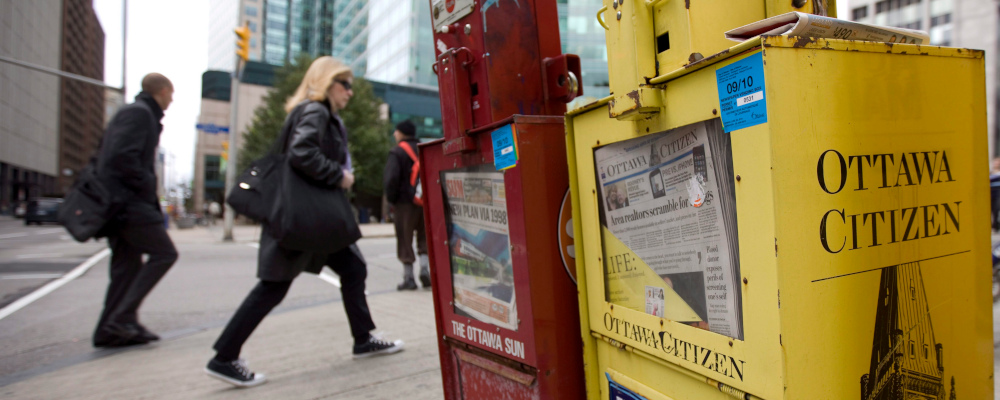The news media in Canada is in crisis. Policy responses to date are failing to solve for the information that citizens need to make informed decisions about important issues and debates. The Future of News series brings together leading practitioners, scholars, and thinkers to imagine new business models, policy responses, and journalistic content that can support a dynamic future for news in Canada.
The past few weeks have seen a score of large layoffs at local media stations across the country. Local news broadcasts were eliminated or scaled back, popular shows ended, and some radio teams disbanded. It’s a sad state of affairs for the fifth estate.
Prime Minister Trudeau indicated his anger at the decision, saying he was “pissed off.” Conservative Leader Pierre Poilievre, meanwhile, used the opportunity to strike back at the government, pointing to their recent multi-million-dollar investment into Canadian media as a failed government bailout. Clearly, that solution doesn’t seem to have worked.

The news has sparked considerable discussion about the future of news broadcasting and the role, if any, government should be playing in this discussion.
But there’s a missing part to this conversation. As we watch local media be slimmed back again and again due to market realities, we risk not only losing local sources of news and information, we risk losing a sense of our collective selves.
I’ve written before here about the challenges in defining a collective identity in Canada. Governments of different stripes have been trying to do this for years. And, as I’ve argued, this is for good reason. Collective identity gives us a sense of unity, of purpose, and of compassion and care for each other.
While governments have sought to shape this identity, media has—perhaps to an even larger degree—been a key driver of the conversation.
Shows like Hockey Night in Canada, with its brash tough guy Don Cherry and his unfailingly polite co-anchor Ron Maclean, brought us together as a country. It helped that the hosts were two sides of the typical Canadian stereotype.
But let’s zoom in to the local level.
In Ottawa where I grew up, there was a long-time news anchor with first CJOH and then CTV Ottawa, the late Max Keeping.
Max was a legend in Ottawa. Not only did we see him on television every night delivering stories from around our city, but he was everywhere. He hosted the local philanthropic telethons, attended community sports, spoke at fundraising dinners, helped boost local eateries, and started his own community initiatives. Max was more than a newsman: he was a community leader. And through his platform on local news, he helped us understand who we were as “Ottawans.”
For people who grew up with Max on the news, there was a palpable sense of community that he helped to forge. We celebrated our local stories together and felt a strong sense of camaraderie during our challenges. I remember his leadership after a pair of tragic suicides claimed the lives of two of our city’s youth. Max shaped the story and emboldened us all to take action. He told us why all of us in the city should care and drove the conversation about how we could prevent this sort of horrible event in the future.
This was also true during the 1998 ice storm when Max not only made sure that residents had up-to-date information about what was happening, but he also used his platform to share inspiring stories. Stories about neighbours helping neighbours and the resiliency of our community. These stories gave us a sense of common purpose and drew us together. Without local coverage, I fear we lose some of that.
Although we lost Max in 2015, his legacy lived on in the Ottawa media. But it’s gradually been chipped away.
This week, the popular long-time hosts of Ottawa’s Move100 Morning Show, Stuntman Stu, Annie, and Janelle, were shown the door. Stu has always been a media figure in Ottawa in the mould of Max—someone who took his responsibility as a community leader with a platform to drive conversations and pull us together during tough times. Losing his voice on the radio is a tremendous loss for our community.
I recognize that not many people tune in anymore to local news or local radio. Certainly not many people in my generation. Why watch the news when you can get it online? Why listen to the radio when there are podcasts galore? And that’s assuming you consume news at all.
The old mediums are dying. Time marches on.
There’s some irony here because although Canadians overwhelmingly claim to believe local media is important, the audience for it has been steadily declining.
But even though new platforms might be taking their place, that doesn’t mean they bring the same value.
So as we mourn the gradual decline of local media, I toss this question back out: how do we preserve this vital role that local media has played in shaping our collective identity?
There are many people pondering the survival of local media, and many solutions are being considered.
Do we subsidize the hiring of journalists? As critics have pointed out, this jeopardizes the independence of media, whether through perception or reality. It’s unlikely this idea will ever gain consensus.

Do we force the social media giants whose platforms disseminate local news to pay more towards supporting it? That policy doesn’t seem to be working well. The fight between government and these companies is putting people’s lives at risk, as we saw when people weren’t able to share up-to-date news information during the wildfires in the North this past August.
Perhaps the key is to use the tax system to support start-up local platforms or podcasts that focus on local issues, then? As fellow Hub contributor, Bill Fox, argued here, an enhancement to the Digital News Subscription Tax Credit could be part of a market-based solution.
Others with more libertarian leanings suggest that this is not a place for government intervention. In an interview on the Herle Burly podcast, American conservative Joe Walsh acknowledged that the collapse of traditional media is problematic, but cautioned against any instinct towards government intervention.
So are there any solutions to this problem that lie outside the realm of government intervention?
The not-for-profit model of journalism could be a potential solution. As Geoff Russ writes here, there are some promising success stories that suggest there is still a market out there for thoughtful, local content that fosters a sense of community.
On the issue of collective identity, we can also look to community organizations, charities, and even social enterprises as the places that will have to increasingly seize the mantle of building a sense of community. All of these organizations rely on fostering feelings of collective responsibility, of caring for your fellow man. Take the Glowing Hearts social enterprise that took off during the pandemic. Hundreds of windows on empty streets were adorned with these neon hearts, building a sense of unity through the darkness. At the time of our greatest isolation, these hearts reminded us that we would get through the tough times together.
And there is also work being done to target the issue of apathy towards media at its root. The CTRL-F program is running in schools today across the country, teaching our youth how to be smarter and more engaged consumers of news, and hopefully inspiring a new generation of interested citizens who look beyond their social media feeds for thoughtful stories.
All of these solutions deserve serious thought. Not just for the sake of preserving local journalism, but also, as I argue here, to preserve our ability to build identity through common stories.
As we move away from local media in the traditional sense, we lose our ability to share our stories to each other. We lose local platforms for leaders to inspire us. We lose a vital avenue to celebrate together in community. We lose our ability to rise up together to meet challenges. We lose our sense of belonging.
After several years of prolonged isolation, people are more desperate than ever for that sense of belonging and community. As the challenges we face become all the more complex, and as our population becomes more heterogeneous, it is more vital than ever that we know how to band together.
I know that the days of tuning in at 6 pm to listen to guys like Max are over. But together, let’s have a serious conversation about how we can take what they’ve taught us into the future.
The Future of News series is supported by The Hub’s foundation donors and Meta.
Recommended for You

Canada’s global performance rankings are in freefall

The government’s proposed anti-hate law is a necessary response to extremism

The government’s proposed anti-hate law is a threat to Canadians’ religious freedoms

In defence of Gretzky



